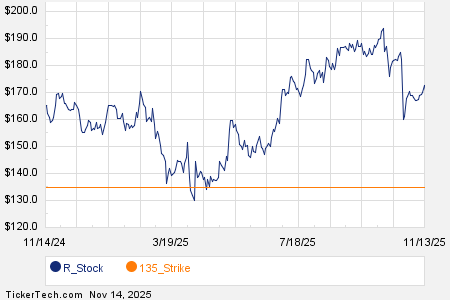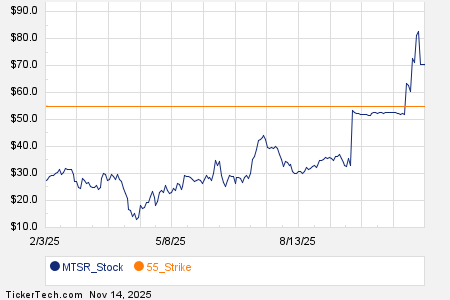Salesforce vs. Oracle: Which Stock is the Better Investment?
Salesforce stock (NYSE: CRM) is currently a more attractive investment than Oracle stock (NYSE: ORCL), primarily due to its favorable valuation. Trading at 9.5x trailing revenues, Salesforce is slightly cheaper than Oracle, which is priced at 9.8x. While Oracle is more profitable, Salesforce’s revenue growth and lower financial risk make it a compelling choice. In this article, we will explore the reasons why CRM is likely to outperform ORCL over the next three years, examining revenue growth, returns, and valuation.
Performance Over the Last Three Years
In the past three years, ORCL stock has delivered impressive gains of 225%, rising from $60 in January 2021 to approximately $195 today. In contrast, Salesforce’s CRM stock has grown by about 65%, moving from $220 to $360. This performance is notable when compared to the S&P 500, which has gained roughly 60% during the same period. Oracle’s stock consistently beat the broader market, yielding returns of 37% in 2021, -5% in 2022, 31% in 2023, and an impressive 85% so far in 2024. Meanwhile, CRM has shown less consistency with returns of 14% in 2021, -48% in 2022, 98% in 2023, and 38% this year, indicating that it fell short of the S&P in 2021 and 2022.
Many individual stocks have struggled to consistently beat the S&P 500 in recent years, including major players in the Information Technology sector like META, COMM, and AAPL. However, the Trefis High Quality (HQ) Portfolio, featuring a selection of 30 stocks, has managed to outperform the S&P 500 each year in the same time frame. The HQ Portfolio group has provided steadier returns with lower risk compared to the benchmark index.
Salesforce Outpaces Oracle in Revenue Growth
Salesforce has enjoyed an average annual revenue growth rate of 18.1%, increasing from $21.3 billion in 2021 to $34.9 billion in 2024 (fiscal year ending in January). Conversely, Oracle’s revenue growth was slower, at an average rate of 9.5%, growing from $40.5 billion in 2021 to $53 billion in 2024 (fiscal year ending in May).
Salesforce’s revenue boost has been largely driven by the rise in subscription and support sales. This surge is fueled by growing demand for its cloud services, including Sales Cloud, Service Cloud, and Marketing Cloud. The company is focusing on harnessing the technological advancements in artificial intelligence and machine learning. Its AI system, Agentforce, is aiding in improving adoption of its offerings.
Oracle is also experiencing growth due to its cloud services, benefitting from the success of its generative AI workloads. The company anticipates doubling its revenue in five years as more on-site database clients transition to the cloud.
Profitability and Financial Risk
Despite its slower revenue growth, Oracle remains more profitable than Salesforce. Oracle’s adjusted net income margin declined from 34.9% in 2021 to 29.7% in 2024, whereas Salesforce’s margin increased from 21.6% to 23.2% in the same period. Currently, Oracle’s 30.3% adjusted net income margin outperforms Salesforce’s 25.5%.
When assessing financial risk, Salesforce holds a more favorable position. Its debt represents only 3% of its equity, significantly lower than Oracle’s 16%. Additionally, Salesforce has a cash percentage of assets at 14%, compared to Oracle’s 8%, indicating a stronger liquidity position.
Conclusion: Salesforce as the Preferred Investment
Salesforce’s superior revenue growth and lower financial risk outweigh Oracle’s profitability. With CRM stock currently priced at $360, it trades at 37x its trailing adjusted earnings of $9.70 per share, while its historical average P/E ratio is 43x. On the other hand, ORCL stock is around $190, trading at 32x its trailing adjusted earnings of $5.77, against a historical average P/E ratio of 22x.
We believe that rising demands for AI-supported cloud services warrant a reevaluation of both stock valuations. Oracle’s current valuation multiple exceeds its historical average, while Salesforce’s is lower. This mismatch suggests the potential for CRM’s valuation to improve relative to ORCL. While both stocks may present solid long-term growth opportunities, our analysis favors Salesforce as the more promising option.
| Returns | Dec 2024 MTD [1] |
2024 YTD [1] |
2017-24 Total [2] |
| CRM Return | 10% | 38% | 431% |
| ORCL Return | 4% | 85% | 468% |
| S&P 500 Return | 1% | 27% | 171% |
| Trefis Reinforced Value Portfolio | 1% | 26% | 837% |
[1] Returns as of 12/9/2024
[2] Cumulative total returns since the end of 2016
Invest with Trefis Market-Beating Portfolios
See all Trefis Price Estimates
The views and opinions expressed herein are those of the author and do not necessarily reflect those of Nasdaq, Inc.





